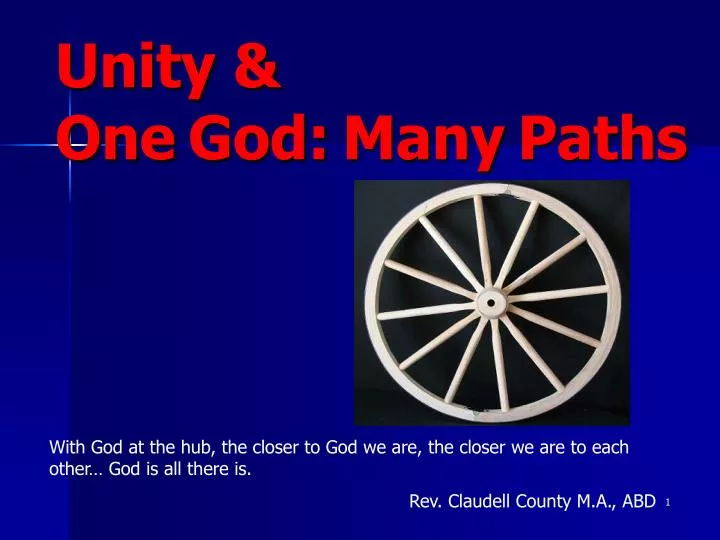In the pursuit of understanding spirituality and the quest for divine truth, a question emerges: “Can there truly be multiple paths leading to the same divine essence?” This inquiry invites profound contemplation and serves as a gateway to exploring the Baha’i perspective on the interconnectedness of religious beliefs. The Baha’i teachings articulate a worldview that celebrates the unity of humankind and the oneness of God, asserting that while distinct religious traditions may appear divergent, they converge towards a singular divine source. This exploration delves into the Baha’i understanding of God, the nature of religious revelation, and the implications of embracing diverse spiritual paths.
At the heart of Baha’i doctrine is the assertion that there is but one God, an omnipotent and transcendent being who governs the universe with wisdom and love. This principle of monotheism is foundational, emphasizing that all major world religions stem from this singular divine entity. The Baha’i text posits, “We must seek out the truth behind the veil of appearances.” This notion encourages individuals to look beyond superficial differences among religions, fostering a more profound appreciation of their shared origins and values.
Through the lens of Baha’i teachings, one must consider the concept of progressive revelation. Baha’is believe that God reveals His will and guidance to humanity through a series of divine messengers—often referred to as Manifestations of God—such as Moses, Jesus, Muhammad, and Baha’u’llah, the founder of the Baha’i Faith. Each of these figures represents a chapter in humanity’s spiritual journey, providing teachings that address the unique socio-spiritual conditions of their respective eras. This progressive approach suggests that rather than viewing religious teachings as static, they are dynamic and adapted to the evolving needs of society.
However, this perspective prompts an intriguing challenge: if all religions stem from the same divine source, how can one navigate the complexities of doctrinal differences? Can the divergences between religious practices and beliefs be reconciled, or must they remain in tension? The Baha’i answer is rooted in the principle of unity—unity of God, unity of religions, and unity of humankind. By fostering an attitude of mutual respect and understanding, adherents are encouraged to engage with the teachings of other faiths while recognizing that each path can lead to the same ultimate truth.
The Baha’i Faith prioritizes the importance of individual investigation of truth. Adherents are encouraged to explore other faith traditions, seeking to understand their teachings and the values they espouse. This approach cultivates a spirit of inquiry, where individuals are not merely passive recipients of doctrine but active seekers of spiritual enlightenment. The Baha’i teachings underscore that the pursuit of knowledge, whether religious or secular, enriches one’s personal experience of faith.
Moreover, the Baha’i framework posits a universal moral code that transcends individual religions. At its core, this ethical foundation upholds values such as justice, compassion, honesty, and the sanctity of human life. Historically, these universal principles have served as the bedrock for interfaith dialogue, promoting cooperation and understanding among diverse religious communities. It serves as an antidote to the prevalent sectarianism that often fuels conflict and strife, thus advancing humanity’s collective conscience towards global harmony.
In exploring the notion of multiple paths to the one God, Baha’i teachings illuminate the powerful concept of unity in diversity. This paradigm asserts that instead of seeing differences as divisive, humanity should embrace them as opportunities for enrichment. Each religious tradition, with its unique customs and practices, contributes to the kaleidoscope of human experience. By engaging with these varied perspectives, individuals can deepen their understanding of the divine and their place within the broader tapestry of humanity.
The implications of the “One God, Many Paths” doctrine extend far beyond personal spirituality; they reach into the realm of social justice and community building. Baha’is are called to actively participate in the betterment of society, advocating for the alleviation of poverty, the promotion of gender equality, and the advancement of education for all. This commitment stems from the belief that spiritual and material progress are inextricably linked. By pursuing social transformation through a unified framework, the Baha’i community aims to reflect the oneness of humanity in practical and meaningful ways.
In summary, within the Baha’i worldview, the proposition of “One God, Many Paths” serves as both a guiding principle and a profound challenge. It compels individuals to engage critically with their own beliefs while fostering a spirit of empathy and learning toward others. This framework does not simplify the complexity of religious differences; rather, it invites a deeper exploration of faith, culture, and ethics. Ultimately, the essence of Baha’i teachings rests on the realization that while humanity may tread different paths, all are called towards the same divine source—a harmonious journey towards unity, peace, and understanding.
